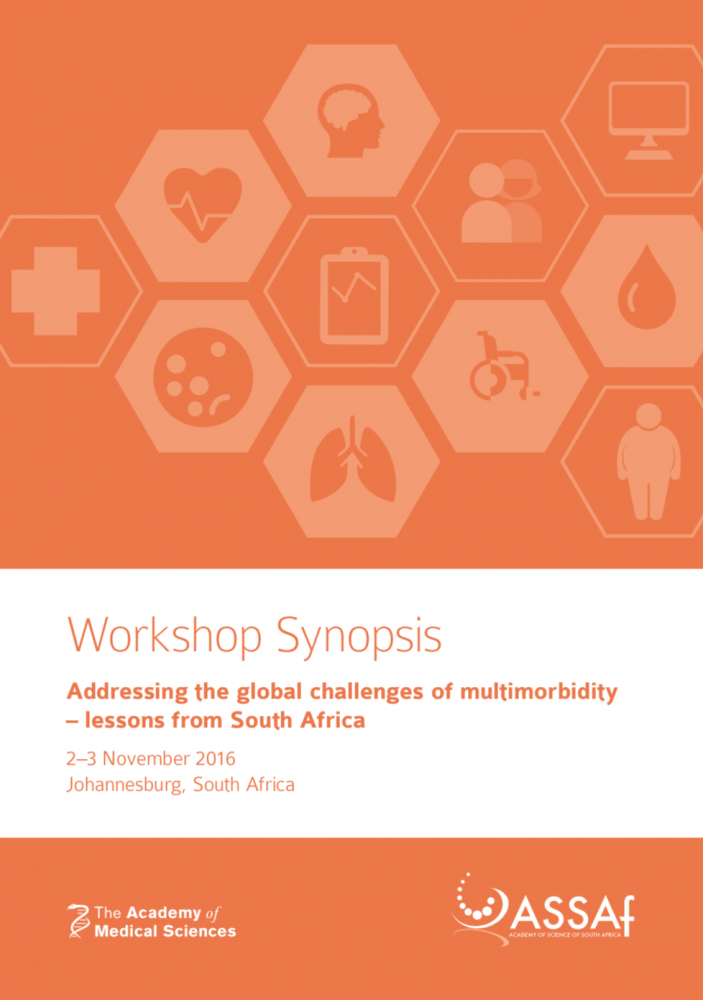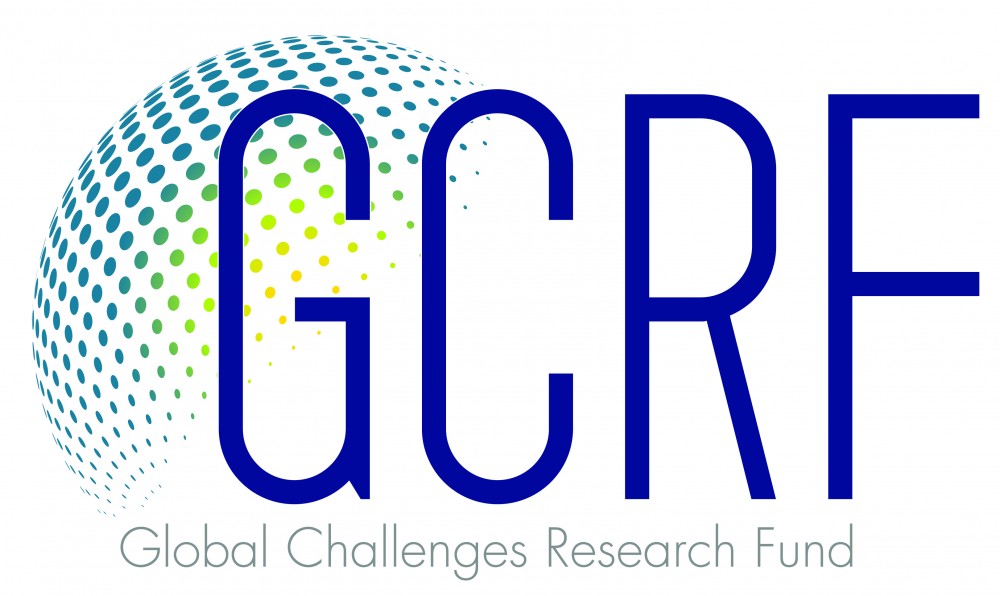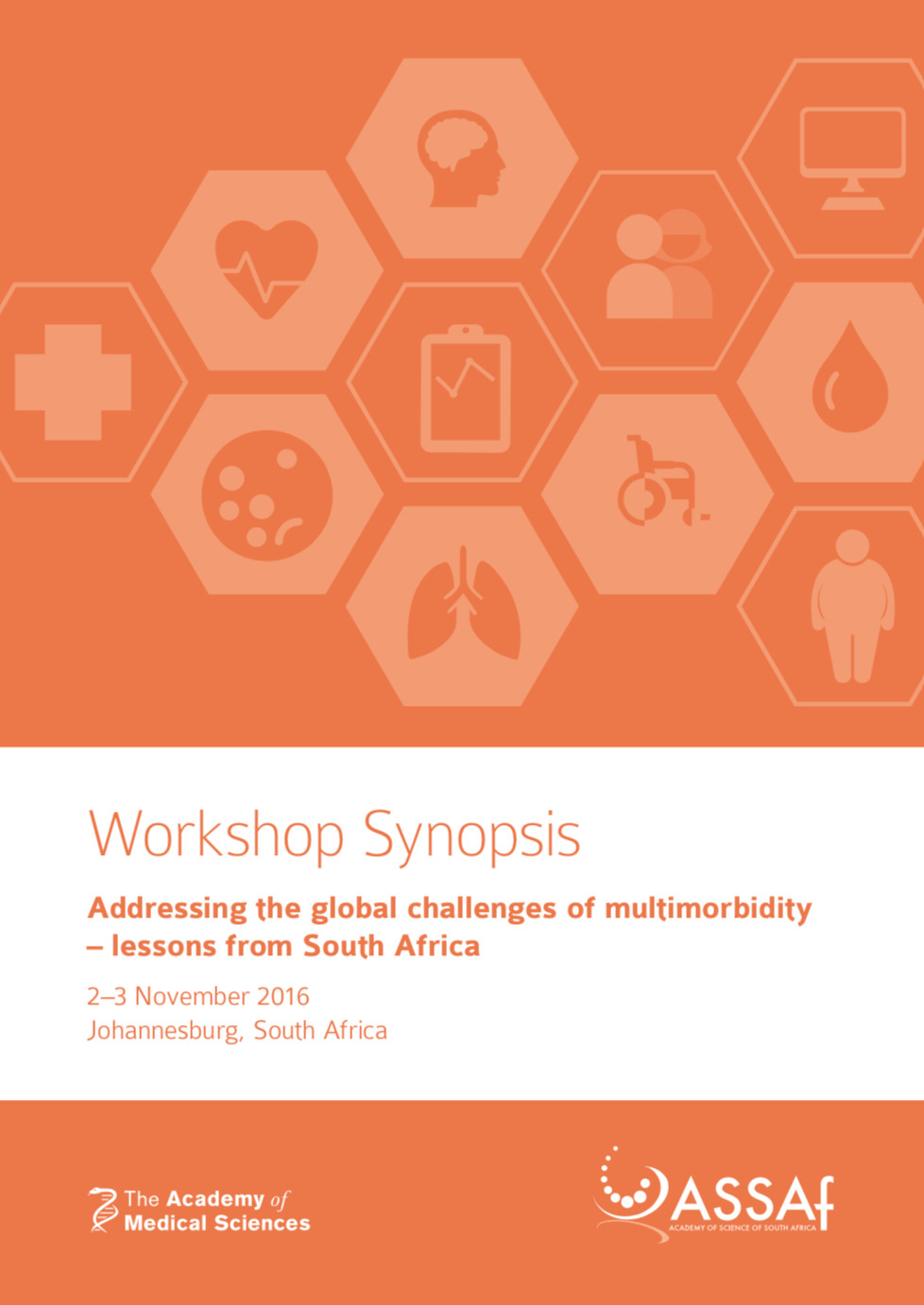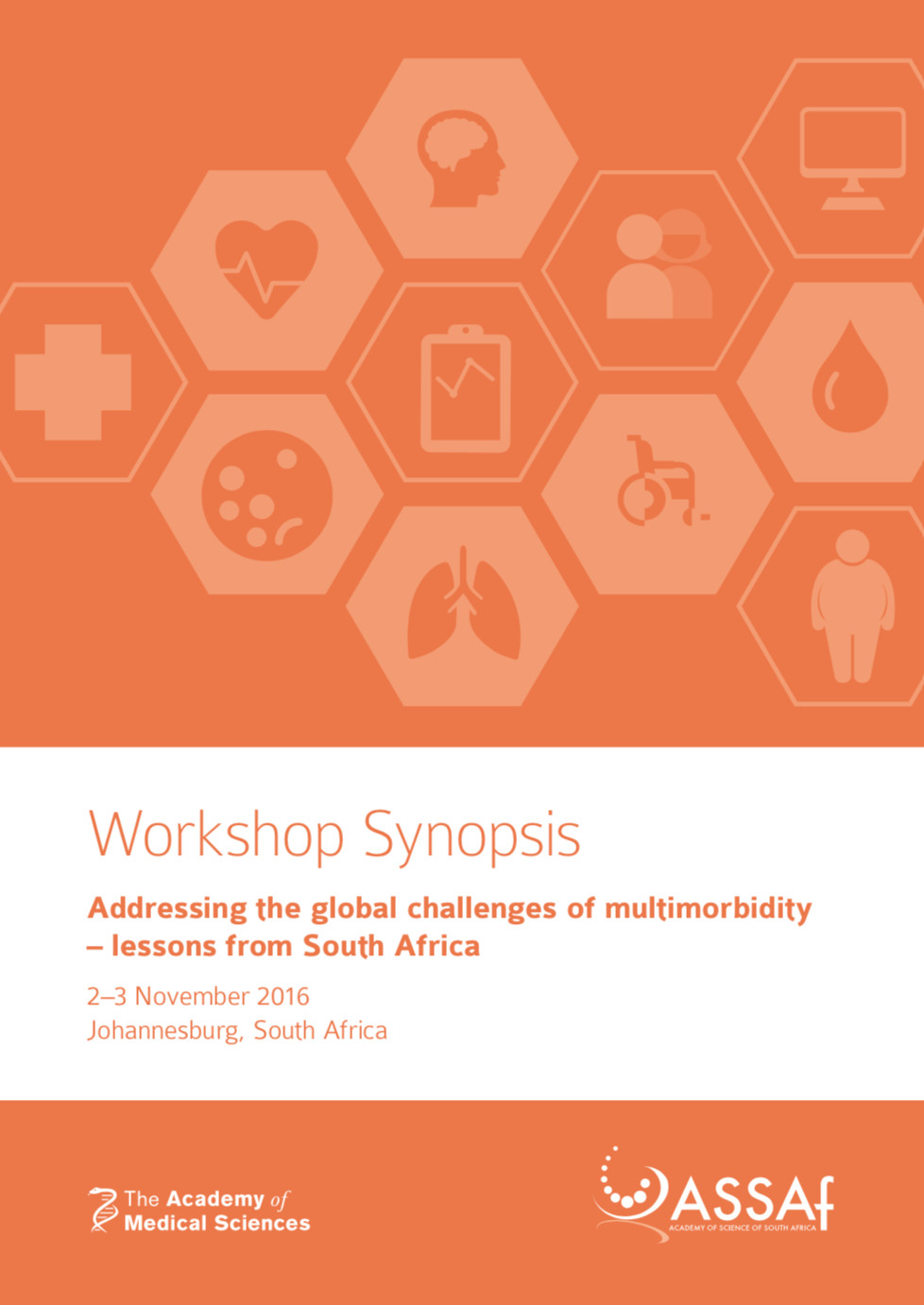This policy workshop, Co-Chaired by Professor Karen Hofman and Professor Stephen MacMahon FMedSci, considered the burden of multimorbidity in South Africa and the UK and asked how we can achieve a more coherent and consistent approach to defining, researching and addressing multimorbidity.
 Following the workshop, a written report was produced and disseminated to UK and South African stakeholders with key recommendations of next steps to address multimorbidity in South Africa.
Following the workshop, a written report was produced and disseminated to UK and South African stakeholders with key recommendations of next steps to address multimorbidity in South Africa.
The report can be downloaded from the downloads tab on the right hand side of this page or by clicking on this image.
The workshop brought together experts and evidence from South Africa, UK and other countries on the prevalence, burden (including cost and health impacts) and determinants of multimorbidity. Participants identified gaps in our knowledge and associated research priorities through a review of the evidence available and considered how health systems are dealing with multimorbidity by discussing key challenges and the costs and financing issues associated with multimorbidity in South Africa.
The workshop formed an important part of evidence collection for the Academy to inform its working group on multimorbidity.
To read more about the Academy's wider work on multimorbidity, the challenges posed by this issue and to find some helpful resources visit our Multimorbidity website hub.
Click here to find out more about our other GCRF workshops and read the workshop reports.

This workshop is funded by the Global Challenges Research Fund that aims to support cutting-edge research that addresses the challenges faced by developing countries. Visit our GCRF webpage to read more about the fund.
The organisation of the workshop was overseen by a steering committee based in both the UK and South Africa. The steering committee members were:
Co-Chair: Professor Karen Hofman, Associate Professor, University of Witwatersrand
Co-Chair: Professor Stephen MacMahon FMedSci FSB, Principal Director, The George Institute for Global Health
Professor Kara Hanson SD, Professor of Health System Economics and Associate Dean for Research, London School of Hygiene and Tropical Medicine
Dr Tolu Oni, Senior Lecturer, University of Cape Town
Dr Nesri Padayatchi, Deputy Director of CAPRISA, University of KwaZulu-Natal
Addressing the global challenge of multimorbidity: Lessons from South Africa
The aims of the workshop were to develop a framework for defining and understanding multimorbidity more widely. In addition, to identify key challenges posed by assessing, research and treatment of multimorbidity.
The workshop was carried out in collaboration with the Academy of Medical Sciences South Africa (ASSAf), the workshop identified the need for a shift away from the current single-disease model for research and treatment to a model of integrated disease care. There is a need for better diagnosis, treatment, and monitoring of multimorbidity. Policy changes need to be implemented to address socioeconomic inequalities in multimorbidity prevalence in particular in LMICs where, as the population ages, the burden of complex chronic disease will increase.
In addition to gathering evidence, the workshops and report are designed to act as a catalyst for future policy activities and build the policy capacity for our national partners in LMICs. Hardcopies were disseminated to key stakeholders in disseminated to BRICS, UK and other LMIC stakeholders.
Top Three Impacts
In addition to gathering evidence, the workshops and report are designed to act as a catalyst for future policy activities and build the capacity for our national partners in LMICs to do policy work. Hardcopies were disseminated to key stakeholders in BRICS countries. The top three impacts from these workshops include:
- ASSAf used the reports to meet with key health policy makers including the South African Medical Research Council, the Department of Science and Technology, the Department of Health and the World Health Organization (WHO). As a result of these meetings:
- Relevant messages were incorporated into the ongoing ASSAf consensus study on Revitalising Health Professional Education.
- A higher prioritisation and consideration has been given to multimorbidity in South Africa for budget allocation.
- ASSAf have presented the report at a number of conferences and meetings: the International Global Young Academy Conference, the ASSAf Standing Committee on Health and the Science diplomacy and gender workshops in Namibia and Botswana respectively.
- ASSAf have used the outputs and gaps identified to submit funding proposals to further assess the prevalence and burden of multimorbidity across Africa with a successful bid to the IAP, leveraging a further $25,000 to do policy work in this area.
- Following the launch of the Academy’s international working group report on multimorbidity, a joint implementation workshop was held with MRC, NIHR, and Wellcome Trust. The outcomes of the workshop have fed into the development of a joint funding call by the MRC and NIHR, which was announced in July 2018 and will aim to increase our understanding of the epidemiology and causes of multimorbidity in the UK. It is also the funders’ ambition to develop a joint multimorbidity strategy with the aim of improving the investment in and policy relevance of multimorbidity research in the UK and global research community.
A follow up workshop by was held in September 2019 in Africa by the AMS and ASSAf focusing on the prevention and management of multimorbidity in Sub-Saharan Africa. You can read more about the workshop here.
The full case study can be downloaded from the download tab on the right.
 Following the workshop, a written report was produced and disseminated to UK and South African stakeholders with key recommendations of next steps to address multimorbidity in South Africa.
Following the workshop, a written report was produced and disseminated to UK and South African stakeholders with key recommendations of next steps to address multimorbidity in South Africa.


